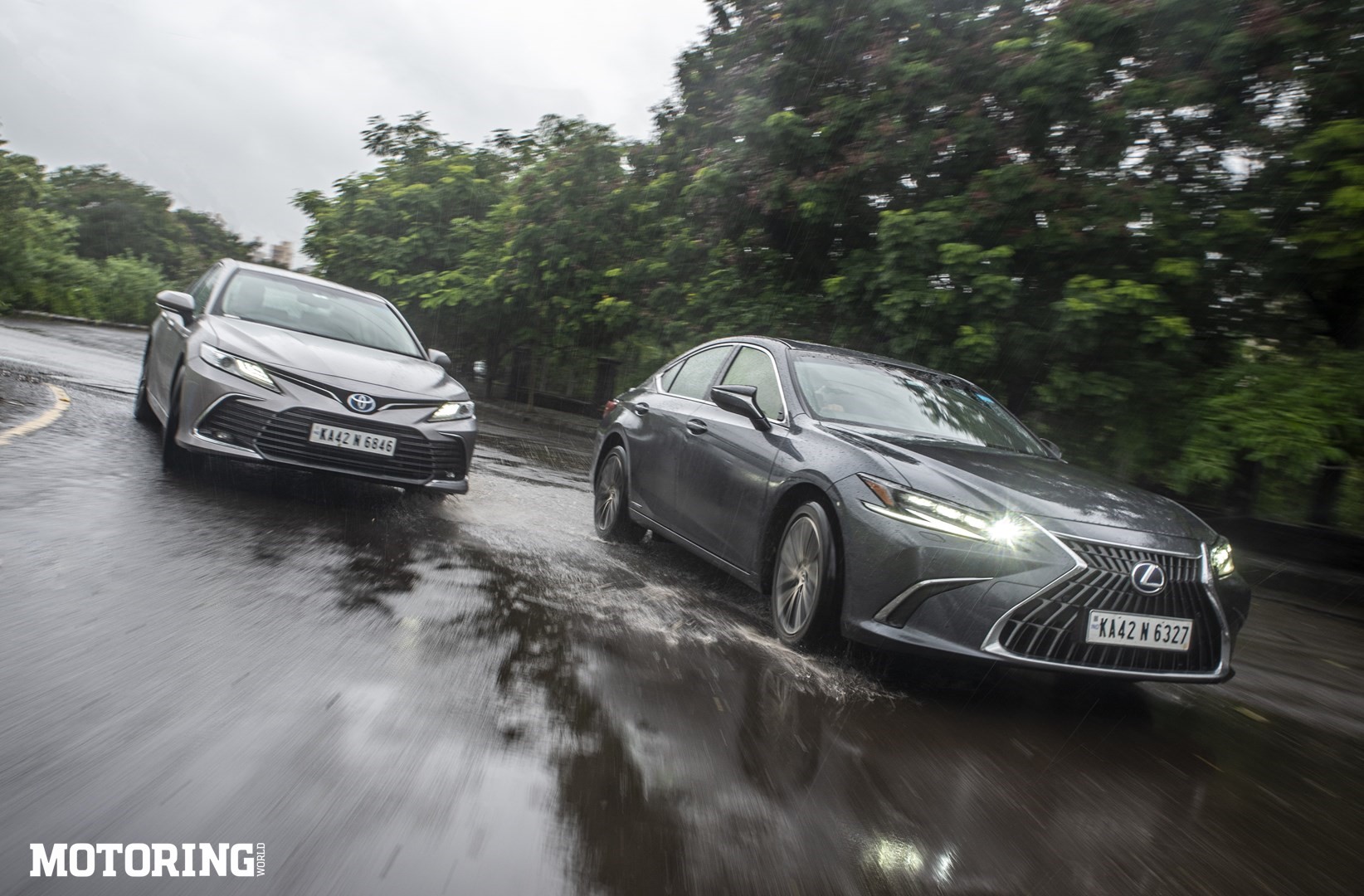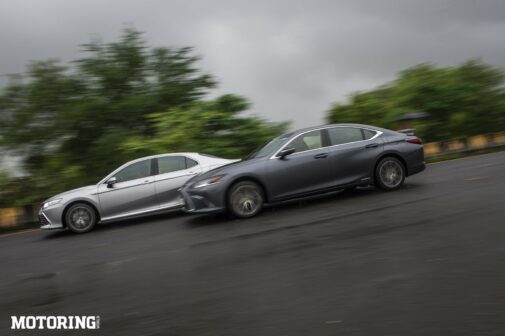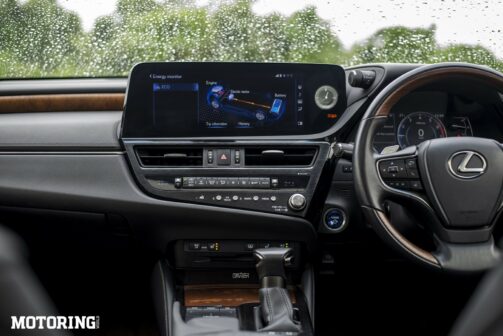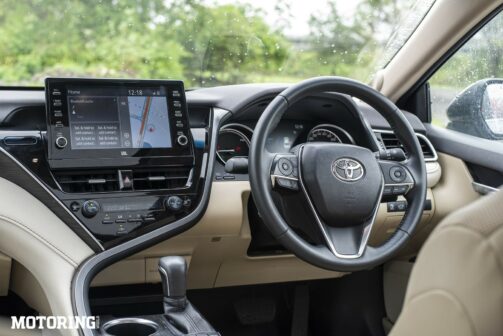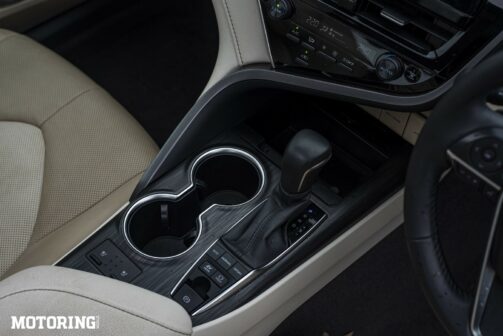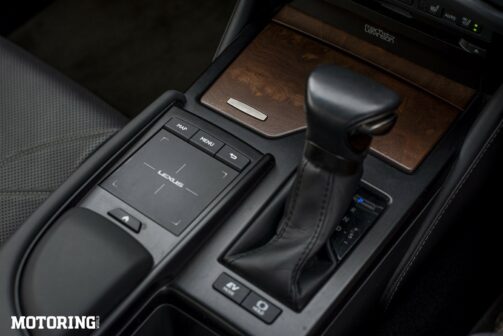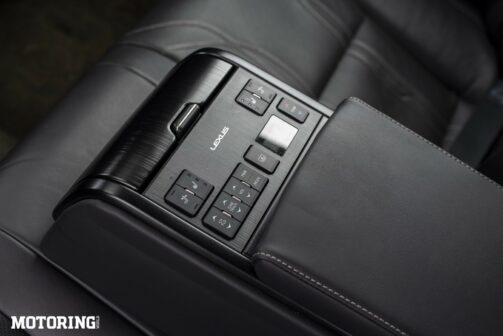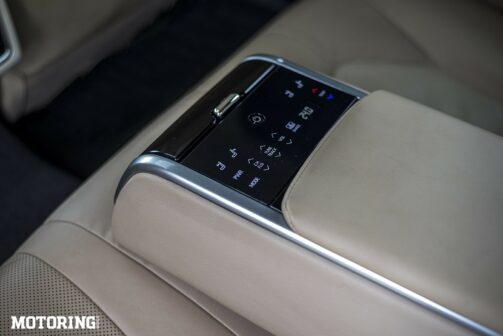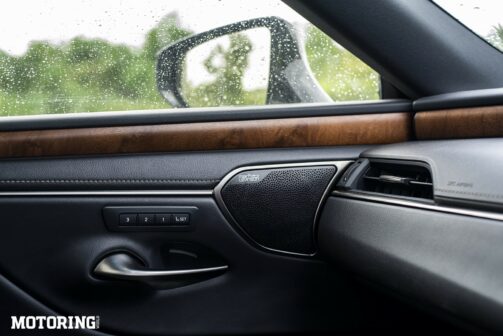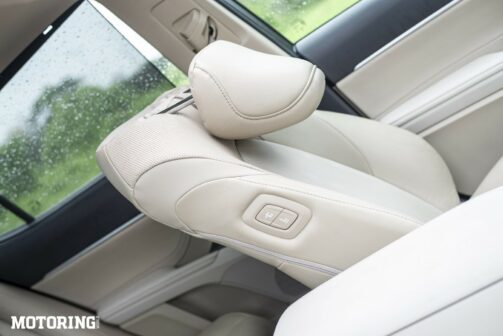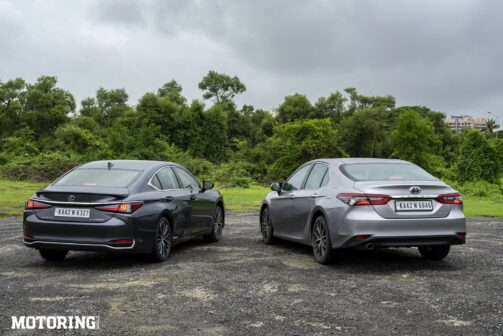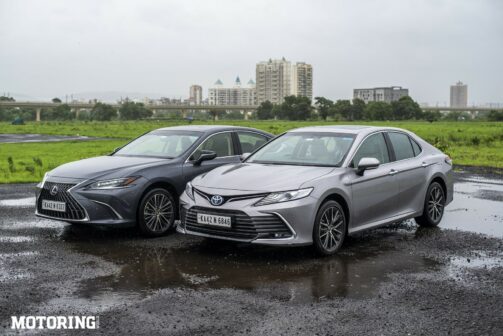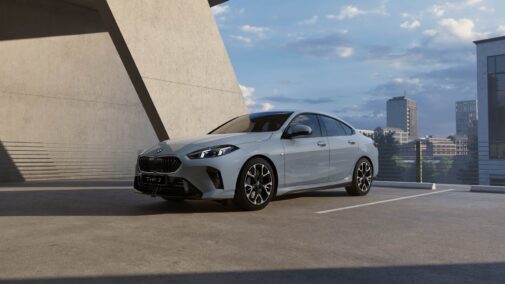There’s a monotony setting into some sections of the Indian automobile industry. I won’t take names, but there are more than a few manufacturers who churn out badge-engineered siblings that are just too much alike. Sure, they’ll look different enough to a layman, but enthusiasts and auto journalists will need back-to-back drives in them to pinpoint nearly microscopic differences. A convenience feature offered or omitted, a final drive ratio that’s changed slightly, or some other minor difference is highlighted, and that’s the end of the story. Which neatly brings me to the two sedans you see here — the Toyota Camry Hybrid and the Lexus ES 300h.
For the most part, these two follow the philosophy mentioned above. They are assembled on the same production line in Chennai, they share the 176-bhp 2.5-litre petrol engine, 118-bhp electric motor, and e-CVT auto gearbox, and even the features list has some serious overlap. From a very narrow perspective, the Rs 21.25 lakh premium you pay for the Lexus seems downright crazy, but there’s so much more going on under the skin, and on it, that makes the ES 300h worth the Rs 65.6 lakh, ex-showroom price.
First off, there’s the design — there’s no question that one will recognise the ES 300h as he svelte Lexus, while the Camry Hybrid looks every bit the part of a low-slung Toyota. Both have styling cues that typify their respective brands, and look pretty desirable. In fact, I’d say the Camry’s rear is a mite more enticing than the ES 300h’s, which came as something of a pleasant surprise. It may be less dramatic than the Lexus, but the Toyota’s rear-end is far from bland. However, on every other design parameter, the ES 300h makes itself known as the more premium of the two.
It even has a longer wheelbase, which bodes well for the space inside, but also means you have to navigate large speed breakers with more care, as the Lexus has a tendency to scrape if driven without special attention. Despite the low ground clearance on both sedans, they both feel like they can smother any road surface (other than those large, uneven mounds the BMC uses for traffic calming purposes), which is an absolute boon when driving, and being driven. The Lexus, especially excels at this, even cocooning its occupants in a near-soundless environment.
In fact, when driven in EV mode, the acoustic glass used on the ES 300h, along with the active noise cancelling feature of the superb Mark Levison sound system mean you’re not going to hear a thing from the outside — nothing from the engine, the road, or the tyres will filter in, but you’ll still hear the sound of a horn, or the occasional wolf whistle as you pass by. It is a Lexus afterall. While the Camry Hybrid also comes through in this regard to a degree, you can definitely identify where some of that difference in price comes from.
Neither the Toyota, nor the Lexus are among the best handling cars, but that’s not to say they aren’t fun to drive. Yes, the steering on both isn’t the most feelsome, body roll is on the higher side, and the 218-bhp hybrid powertrain is humdrum, but those latter two points do add some amount of excitement. When the petrol engine kicks in, there’s a pleasing, slightly rorty sound that comes from the four-cylinder unit, and as the revs climb, it does deliver a sense of speed. Both cars have similar cornering characteristics, though the roll is better controlled in the Lexus, despite feeling heavier overall.
Still, that roll also provides a dose of fun, giving you the illusion that you’re pushing hard even in medium corners. Grip levels from the identical 235/45 R18 Bridgestone Turanzas are also rather good, which helps deliver confidence, and the steering is direct enough so that you always know where you’re going. Push both these luxury sedans to eight-tenths of their maximum potential — any more and they’ll understeer and behave unruly — and the Camry Hybrid and ES 300h can be quite playful. Their respective e-CVT gearboxes are tuned for comfort and smoothness more than quickness and speed, but they do a more than adequate job in all respects.
What takes away some of that joy, at least in the Camry, is the lack of a proper tachometer. You’ll need to turn on the heads-up display to know exactly where you are in the engine’s rev range. And if you do use the hybrid powertrain to its capacity, the Eco Score display (which scores you out of a 100) on the digital MID will sit in judgement of you, marking you down for driving with a heavy pedal. And despite averaging less than 80 out of 100 consistently, the Camry Hybrid’s fuel economy indicator said I was getting over 14 kpl. Now, that’s far more than what I got when I was testing the Maruti Suzuki Baleno!
The ES 300h also performed similarly in the fuel-efficiency game, making these luxury sedans more frugal than premium hatchbacks and compact SUVs. I found this fact to be absolutely astounding, leading me to the conclusion that petrol-electric hybrids can deliver diesel engine-like efficiency figures, and still retain those aspects of a naturally-aspirated petrol engine that I have come to cherish, such as the linearity of acceleration and the instant response from mashing the go pedal. This also led me to another conclusion — dynamically, economically, and performance-wise, the Camry Hybrid and Lexus ES 300h are, sadly, quite similar.
That just leaves the cabin experience, which, needless to say, the Lexus out-does the Toyota on almost every metric. The Camry Hybrid is a spacious, comfortable, and well-appointed sedan, but the ES 300h provides more legroom, features such as cooled rear seats, oodles more leatherette, and a very classy wood finish. While both get buttons for the rear left side passenger to adjust the front passenger seat, interestingly, Toyota does provide one feature that coddles in a way the Lexus does not, and that’s with a button to fold away the front passenger headrest, providing the person at the back a clear view out the front. And I have to admit that I found the lighter finished beige cabin in the Toyota to be more cheery than the dark overtones used in the plush Lexus.
So, to go back to the beginning, despite the price difference between the Lexus ES 300h and the Toyota Camry Hybrid — which amounts to the on-road price of my Kia Seltos long-termer — there are plenty of good reasons to stretch for the more premium sedan. That’s not to say the Camry Hybrid isn’t worth the Rs 44.35 lakh, ex-showroom, Delhi, price tag, as it is a comprehensively luxurious sedan in its price range. It’s just that the ES offers that much more luxury and sophistication for the price. And then there’s the wow factor involved in buying and owning a Lexus, which is just too hard to ignore.
AUTODATA
Lexus ES 300h LuxuryPOWERTRAIN
Displacement:
Max Power:
Max Torque:
Transmission:
2487cc, I4, petrol-electric
218 bhp
20.56 kgm
e-CVT
TYRES
F/R: 235/45 R18
DIMENSIONS
L/W/H (mm):
Wheelbase:
Ground Clearance:
Kerb Weight:
Fuel Capacity:
4975/1865/1445
2870 mm
151 mm
1740
50 litres
PRICE
Rs 65.60 lakh (ex-showroom, India)
AUTODATA
Toyota Camry HybridPOWERTRAIN
Displacement:
Max Power:
Max Torque:
Transmission:
2487cc, I4, petrol-electric
218 bhp
20.56 kgm
e-CVT
TYRES
F/R: 235/45 R18
DIMENSIONS
L/W/H (mm):
Wheelbase:
Ground Clearance:
Kerb Weight:
Fuel Capacity:
4885/1840/1455
2825 mm
160 mm
1665 kg
50 litres
PRICE
Rs 44.35 lakh (ex-showroom, Delhi)





